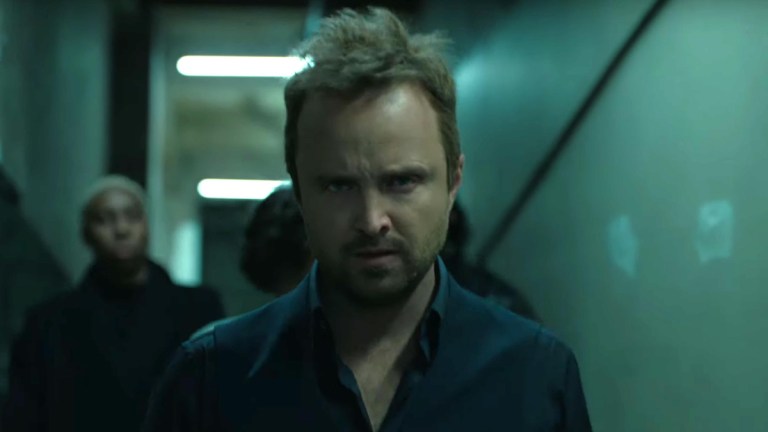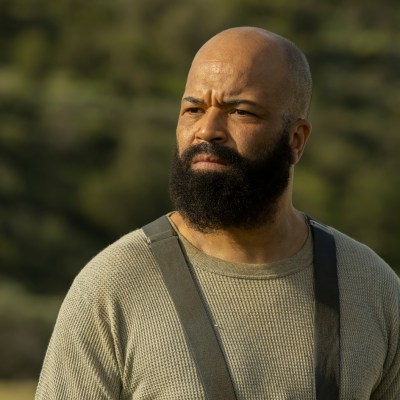Westworld Season 3: What is Aaron Paul’s Caleb Up To?
We dive into our first introduction to Aaron Paul’s Caleb in Westworld Season 3 and what he might represent.

This article contains major spoilers from the Westworld Season 3 premiere. You can find our spoiler-free review here.
In a land where artificial intelligence is God, the man who distrusts technology could be called a heretic. This might be the best way to describe Aaron Paul’s Caleb, Westworld Season 3’s major new cast addition.
Introduced as a man suffering on the inside and out after some only hinted at trauma during wartime, Paul’s Caleb is a stoic representation of crime and the end results of a future literally planned by the data mined from the phone in your pocket. Also more than Dolores, Bernard, or whoever is inhabiting Charlotte’s robo-clone body these days, Caleb is the one to truly give us a hard look at what Westworld’s cynical future has become.
Early in the first episode, we spend a day-in-the-life with Caleb and get to experience “better living through technology” and all that represents. Probably the most intriguing futurist element for viewers though is his conversations with “Francis,” an artificial intelligent approximation of an old friend. Near the top of the hour, Caleb’s therapist reveals he doesn’t have the patience to actually talk through a “talking cure” with his patients. Rather he does the bare minimum before pawning them off on an app on their phone.
When “Francis” (or Faux-Francis) first calls Caleb, the quiet man walks him through his day-to-day. He lays fiber during the day with co-worker, George, a literal robot who visibly depresses Caleb despite his protestations of otherwise; Caleb also visits his dementia-addled mother in the hospital where she doesn’t remember him; at night, he indulges a “night shift” that even audio app Francis seems to be aware of—Caleb commits small-time crimes.
In one of the episode’s most curious dystopian twists, it appears if you want to be a criminal there’s an app for that. Humorously, the name of it is RICO, which appears to be a reference to the federal Racketeer and Corrupt Organizations Act (RICO), which was written in 1970 to fight organized crime. It also not-so-coincidentally featured prominently in The Dark Knight, which Jonathan Nolan co-wrote. In the future though, it seems to almost nihilistically been co-opted as a cynical name for criminal “contractors” taking jobs like they’re Uber drivers. The app even has a moving logo that looks like the stars of Spring Breakers.
With job offers designated by their distance—be it a smash and grab “1.5 [miles]” away or “redistributive justice” merely 3.4 blocks away—it is a future landscape where criminals set their own hours and possibly all go down together if they get pinched. Intriguingly, among the possible job types is “Personals,” which sounds dangerously close to murder in that “I Hear You Paint Houses” kind of euphemistic way. And as Caleb says repeatedly over tonight’s episode, “I don’t do personals.”
But these are just the means by which technology augments his life. Why it’s important to the episode is how it actually affects him. As we discover in Dolores’ parallel storyline, much of the modern world (at least in the U.S.) is automated by the civic planning data created by the Incite corporation’s Rehoboam AI machine. A literal giant orb sitting in a Los Angeles office building’s lobby, we haven’t seen many devices this ominously dystopian since HAL 9000. As the episode unspools, it is strongly implied that the machine maps out a system for all living individual societies presumably via data it’s mined through their interaction with technology. This is to say that in Westworld’s future, your life is being planned out for you by a computer studying everything you’ve ever clicked on, on the internet and everywhere you’ve gone on your GPS-tracked phone. Rosy, isn’t it?
All of which brings us back to Caleb. Despite a machine creating order based on our data, or at least creating recommendations that governments and other private businesses are likely paying for, the system is also rigged to keep folks like Paul’s character at the bottom. Hence his cynicism.
Early in the episode, Caleb laments, “They say it’s a meritocracy where the system picks the right people for the right job, which is great, I guess, but I don’t know where that leaves the rest of us. The people who didn’t make the cut.” This cynicism is justified as even after probably serving his country in an army (although it doesn’t necessarily look like he was dressed as U.S. military in his flashbacks), Caleb is still left in a position where he cannot find work better than laying fiber with a robot. Given his presumable criminal record, Caleb’s also trying to get his score up by applying for jobs, but he cannot even get past the computerized screeners he talks to over the phone.
Instead he sits in relative squalor, wondering why if the system is so orderly he doesn’t have enough money to pay for his mother’s medical bills. Indeed, we see a scene of a hospital worker suggesting he move his mother to a state-run institution, indicating that even decades into the future, America still will not have universal healthcare, and the poor will still get left behind.
“The way you said the army was run, algorithms? That’s the way everything is going to be someday,” Caleb tells Faux-Francis during their first phone call. “Better living through technology. Some things are better, but I don’t know.”
The point is that Caleb does know, and it’s a rotten dystopia where the game is rigged more so than ever against anyone outside of the top 10 percent (much less top one percent) of the income brackets. Rehoboam has him running on a hamster wheel, which is why he opts out of using his “implant” to smooth the edges (like some kind of implied technological opioid). Faux-Francis is also meant to be another such tonic.
Because despite being a digital approximation of a friend he saw die in the wars, Caleb doesn’t fall for Francis’ illusions. He initially doesn’t even want to call him Francis. Rather Caleb resists early platitudes like “keep climbing.” But by the end of the episode, he sees through the facade fully when he gets the milquetoast suggestion of “you still have to play [the game] if you want a chance to win, right?”
Caleb icily responds, “No, that’s not what you thought at all. The real you, I mean. You said that the system didn’t care about us at all… I need to get on with my life. I need to find someone, something, real. Unsubscribe.” This also is further indication that despite AI being able to create digital approximations, they’ve never gotten so far as the Delos company did at creating actual robotic clones of people like Big Jim Delos himself or Arnold.
For tonight’s episode though, Faux-Francis’ failure at seducing Caleb into complacency underscores the latter’s intimate distrust of technology and Incite’s plan. He sees where it’s left him and his mother, and he sees how it continues to drive him toward wetwork on RICO jobs while he gets turned down from legitimate jobs. And one of those RICO jobs brings him to someone who is very real, even if she is decidedly not human. It brings him to Dolores.
You might have missed on your first watch, but the reason Caleb winds up at the climax of the episode is because he responds to a RICO job listed as “Party Cleanup.” This involves bringing designer drugs to a park where Liam and Incite Bag men intend to murder Dolores while framing it as a drug overdose. We also get a hint at his aptitude for violence. While he doesn’t do personals, and is clearly disturbed when he realizes these drugs are for a young woman who appears passed out in a car, he gives up the drugs when a gun is pointed in his face. Not that it really phases him. He even tells Liam it wouldn’t be the first time he’d been shot in the head.
He also circles back to discover Dolores is alive if badly hurt. As it turns out, robots cannot overdose on drugs! With their final shot of the evening framing Dolores in Caleb’s arms, it’s obviously suggesting this will be a crucial relationship in season 3. That would also make Caleb the first important human contact in Dolores’ existence since young William more than 30 years ago. However, Caleb is not particularly interested in technology and the better living it has to offer. Will he be interested in helping Dolores when he learns she is a robot, and her idea of better living is a world without humans? Or maybe will he be okay with a regime change? Time will tell on that last bit…


